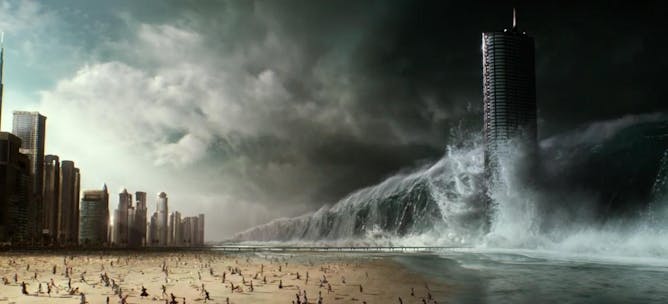|
|
|
Editor's note
|
|
Under the smoke haze, photos being taken across New South Wales look like stills from a post-apocalyptic film. The sickly orange glow of the air; the pedestrians with face-masks; the smouldering red sun.
In this era of climate crisis, scenes we once saw only on screen are now in our lives; and filmmakers are being forced to grapple with this new world.
Considering the fire that covers our east coast, Ari Mattes has taken a look at films exploring eco-disasters on screen. Do these movies help us in enacting change in the face of a changing world? Or do they hinder, pacifying us with stories where the heroes save the day, so we don’t have to do the work ourselves?
And perhaps most pertinently: do we want to watch these stories in the cinema, when instead we could just switch on the news?
|
Jane Howard
Deputy Section Editor: Arts + Culture
|

|
|
Top story
|

A scene from the 2017 film Geostorm: many societies have historically attempted to deal with collective trauma by replaying and restaging it in art.
Warner Bros., Electric Entertainment, Rat Pac-Dune Entertainment
Ari Mattes, University of Notre Dame Australia
Natural disasters are becoming more frequent and Hollywood cinema has kept pace. In a time of global warming, these 'eco-disaster' films are fraught with meaning.
|
Environment + Energy
|
-
Blanche Verlie, University of Sydney
Fuming, burnt out, drained. Can our smoky cities spark a change in the political atmosphere?
|
|
Health + Medicine
|
-
Abishek Santhakumar, Charles Sturt University
When you hurt yourself, tiny blood vessels can break under the skin. The blood that oozes out is what gives a bruise its colour.
-
Freya MacMillan, Western Sydney University; David Simmons, Western Sydney University; Tinashe Dune, Western Sydney University
Women with diabetes are at high risk of pregnancy complications. But there is a lot women can do to have a healthy pregnancy and a healthy baby.
|
|
Politics + Society
|
-
Tony Walker, La Trobe University
Around the world, frustrations about growing inequality and inadequate responses to climate change are fuelling protests – and these are likely to grow bigger and more violent in the next year.
-
Vicki Lowik, CQUniversity Australia; Annabel Taylor, CQUniversity Australia
Evangelical Christian churches say a man's authority is in God's plan.
|
|
Arts + Culture
|
-
Tanya Dalziell, University of Western Australia; Paul Genoni, Curtin University
Nick Broomfield's latest documentary explores the romance between Leonard Cohen and Marianne Ihlen. But the film fails to confront the harder truths of the license taken by, and conceded to, creative men.
|
|
Science + Technology
|
-
Nalin Asanka Gamagedara Arachchilage, UNSW
While the data from a fingerprint is very hard to retrieve, cybercriminals can get around biometric technology in various ways. And having a weak passcode is like giving them a hall pass.
-
Szymek Drobniak, UNSW
Emerging evidence suggests that prolonged stress exposure can accelerate the ticking rate of an internal cellular clock. By doing so, stress can contribute to faster ageing and body deterioration.
|
|
Business + Economy
|
-
John Quiggin, The University of Queensland
Market forces don't work well in education. For-profit businesses are more tempted to exploit loopholes than provide quality service.
-
Richard Holden, UNSW
Charter of Budget Honesty aside, we can expect assumptions that stretch credulity so the Australian government can maintain its surplus forecast.
|
|
Education
|
-
Luke Zaphir, The University of Queensland
Constructivism is an educational philosophy that underpins the inquiry-based method of teaching, where the teacher facilitates a learning environment in which students discover answers for themselves.
-
John Sweller, UNSW
There are two types of knowledge – we've evolved to acquire the first naturally; we need schools for the second. Cognitive load theory explains how to teach knowledge we don't automatically get.
|
|
Cities
|
-
Liam Davies, RMIT University; Ian Woodcock, Swinburne University of Technology
While called a transportation plan,
it was heavily skewed towards roads. We need the type of city-shaping thinking that underpinned the plan, but today's plans must match 21st-century priorities.
-
Chris Hartley, UNSW; Kathleen Flanagan, University of Tasmania
Helping tenants find work supposedly creates a pathway into private rental housing, freeing up social housing for others. Private rental costs and the situations of many tenants make that unrealistic.
|
|
| |
Featured jobs
|
|
|
Featured events
|

|
Kolling Institute of Medical Research, Kolling Auditorium, Level 5, Building 6, Royal North Shore Hospital, 10 Westbourne Street , St Leonards, New South Wales, 2064, Australia — University of Sydney
|
|
|
|
| |
| |
| |
| |
| |
|
|
|
|
|
|
|